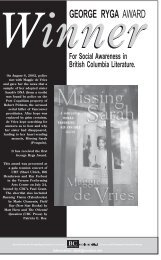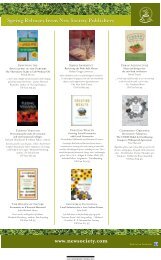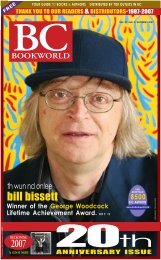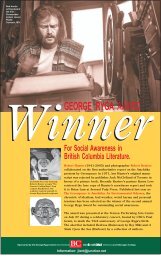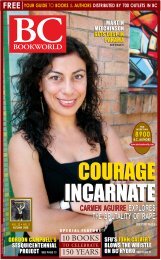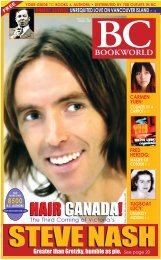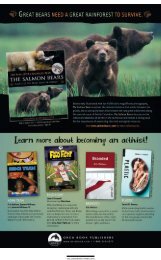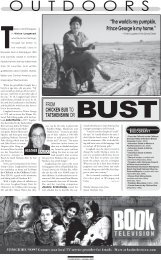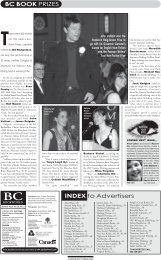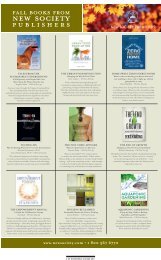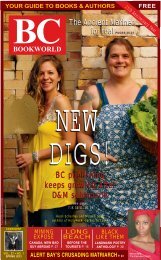BC letters - BC BookWorld
BC letters - BC BookWorld
BC letters - BC BookWorld
You also want an ePaper? Increase the reach of your titles
YUMPU automatically turns print PDFs into web optimized ePapers that Google loves.
7 <strong>BC</strong> BOOKWORLD SUMMER 2009<br />
continued from page 5<br />
which the Rampas doted on, preferring<br />
feline company to human. This had sidebenefits.<br />
According to Rampa, his<br />
Siamese cat Fifi Greywhiskers telepathically<br />
dictated an entire book to him,<br />
which diligently he translated from the<br />
‘Siamese cat language’ into English. The<br />
book is called Living with the Lama.<br />
It is through the eyes of Sheelagh<br />
Rouse that Rampa’s Vancouver interlude<br />
comes into focus—described three decades<br />
later in a book called Twenty-Five<br />
Years with T. Lobsang Rampa (Lulu<br />
Books, 2005). According to her, Rampa<br />
liked the water views in Vancouver, but<br />
he found the people less than friendly—<br />
and definitely not cat-friendly (the entourage<br />
failed to find a suitable rental<br />
apartment that would accept cats).<br />
By the 1970s, Rampa was suffering<br />
from chronic health problems and got<br />
around in a wheelchair. He railed against<br />
Vancouver’s lack of wheelchair access,<br />
and railed against ‘women’s libbers’ and<br />
teenagers. But the last straw was fans<br />
chasing him along the streets of the West<br />
End (he pretended not to be Dr. Rampa<br />
when accosted).<br />
Eventually, the Rampas moved to<br />
Calgary, where they were left in peace<br />
for a lengthy stretch of time—over six<br />
years. Rampa even dedicated a book to<br />
the city of Calgary. In 1980, Sheelagh<br />
Rouse had a falling-out with Rampa and<br />
left in a huff—taking up employment<br />
in Vancouver. Rampa promptly disowned<br />
her. Rampa died in Calgary in<br />
1981. His lucrative royalties were apparently<br />
donated to several cat organizations<br />
in Canada and the US.<br />
✍<br />
Death usually puts a crimp in the output<br />
of most authors. Not so Lobsang<br />
Rampa. His books continue to sell and<br />
sell, with The Third Eye remaining his<br />
most popular title. He even managed to<br />
produce a book posthumously. It is<br />
called My Visit to Agharta, about his<br />
foray to the subterranean Himalayan<br />
realm of Agharta. The book was cobbled<br />
together from supposedly long-lost papers<br />
belonging to Rampa, and published<br />
in 2003—over ten years after his death.<br />
To this day, librarians are mystified<br />
where to shelve Rampa’s books—under<br />
religion, occult, paranormal, thriller, scifi<br />
or autobiography. The best solution<br />
yet seen: file them under ‘New Age.’<br />
Lobsang Rampa is profiled in<br />
Michael Buckley’s recent<br />
book Eccentric Explorers: Unravelling<br />
the Mysteries of Tibet—Wild and<br />
wacky Adventurers of the Tibetan Plateau.<br />
The book views the rich culture<br />
and history of Tibet through a<br />
rather unusual lens—through the<br />
eyes of ten eccentric adventurers<br />
bent on unlocking its secrets.<br />
Eccentric Explorers is available<br />
from www.chapters.indigo.ca or from<br />
www.itmb.ca<br />
Buckley is author of several<br />
books on Tibet, including Shangri-<br />
La: A Travel Guide to the Himalayan<br />
Dream. His Tibet-themed website is<br />
at www.himmies.com<br />
25<br />
F A M O U S<br />
LITERARY<br />
VISITORS<br />
ALLEN<br />
GINSBERG<br />
2<br />
ALLEN GINSBERG<br />
made several visits to<br />
Vancouver, notably in November<br />
of 1978 when he headlined two<br />
evenings in support of his friend Warren<br />
Tallman’s Vancouver Poetry<br />
Centre and its ‘defence’ of Talonbooks<br />
under attack from Conservative MPs in<br />
the House of Commons.<br />
The former advertising scribe and author<br />
of Howl in the 1950s asked for a<br />
‘good vibe’ audience for “lifting the<br />
city to Heaven which exists and is<br />
everywhere about us.” When<br />
Ginsberg appeared at the PNE<br />
Gardens Auditorium, the tonedeaf<br />
poet received guitar back-up<br />
from Gary Kramer of the venerable<br />
Vancouver group Brain Damage.<br />
While in Vancouver, Ginsberg<br />
expressed some dismay that his droning<br />
and simple harmonium playing was<br />
not met with a recording contract<br />
from Columbia. Ginsberg, who<br />
died in 1997, never<br />
made it onto<br />
American<br />
Idol.<br />
3 WHEN<br />
RAYMOND<br />
CHANDLER<br />
THE UNITED STATES<br />
joined the First World<br />
War effort, mystery novelist Raymond<br />
Chandler enlisted in the Canadian<br />
forces and underwent basic training in<br />
Victoria with the Gordon Highlanders<br />
prior to being sent to France via Halifax.<br />
Although he was born in Chicago,<br />
Chandler had been raised in England<br />
where he became a naturalized British<br />
citizen.<br />
Chandler once recalled his threemonth<br />
stint in Victoria in a letter to a<br />
friend: “If I called Victoria dull [in a preceding<br />
letter], it was in my time dullish as<br />
an English town would be on a Sunday,<br />
everything shut up, churchy atmosphere<br />
and so on. I did not mean to call the people<br />
dull. Knew some very nice ones.”<br />
Later to become widely known for his<br />
novels The Big Sleep (1939), Farewell, My<br />
Lovely (1940)<br />
and The Long<br />
Goodbye<br />
(1954),<br />
Raymond Chandler<br />
Chandler was discharged from the Royal<br />
Airforce on February 20, 1919 in Vancouver.<br />
Raymond Chandler’s final novel<br />
Playback (1953) was set mostly in<br />
Esmerelda, California, featuring Philip<br />
Marlowe, but his screenplay of the same<br />
name was mostly set in Vancouver. Published<br />
in New York by Mysterious Press<br />
as Raymond Chandler’s Unknown<br />
Thriller (1985), the revised screenplay/<br />
story opens with a beautiful blonde,<br />
Betty Mayfield, crossing the border on<br />
a train, having narrowly escaped being<br />
imprisoned for a murder she did not<br />
commit. In Vancouver she again becomes<br />
the prime suspect in a murder investigation.<br />
She writes a suicide note in<br />
the Hudson Bay Department Store but<br />
she’s dissuaded from killing herself by<br />
Brandon, a debonair millionaire who<br />
promises to help her by whisking her<br />
over to Victoria in his yacht. The<br />
Vancouver Police Department’s<br />
Detective Killaine<br />
cleverly determines the<br />
murderer is Brandon,<br />
who is planning to kill<br />
Betty on his yacht. He<br />
rescues Betty with a<br />
helicopter.<br />
Raymond Chandler<br />
was unusually<br />
well paid to write the<br />
script and took particular<br />
care to revise<br />
it. Although it contains<br />
excellent sardonic<br />
dialogue and<br />
it carefully recognizes<br />
the cultural<br />
differences between<br />
Canada and<br />
the United States,<br />
Chandler had difficulty<br />
transcribing<br />
the story into<br />
a novel. It lacks a<br />
cryptic first person<br />
narrator like<br />
his famous<br />
‘hardboiled’ private<br />
detective Philip<br />
Marlowe.<br />
Raymond Chandler<br />
became president<br />
of the Mystery<br />
Writers of America<br />
and died of pneumonia<br />
brought on by an<br />
unusually heavy<br />
drinking binge on<br />
March 23, 1959.<br />
Allen Ginsberg in<br />
Vancouver. Photo<br />
by cartoonist<br />
David Boswell



